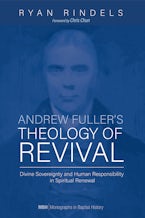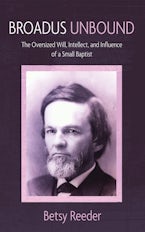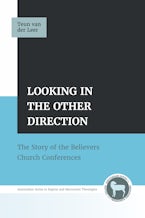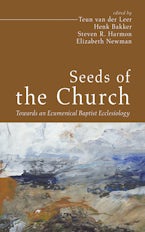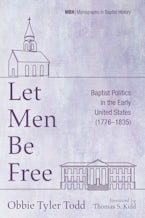- Home
- Monographs in Baptist History
- religion
- Andrew Fuller’s Theology of Revival
Andrew Fuller’s Theology of Revival
Divine Sovereignty and Human Responsibility in Spiritual Renewal
by Ryan Rindels
Foreword by Chris Chun
Series: Monographs in Baptist History
Imprint: Pickwick Publications
Revival is the arguable heartbeat of evangelical Christianity. Though a theologically diverse and globally diffused phenomenon, evangelicalism originated in a distinctly Calvinistic milieu. Many Puritans in the seventeenth century, "evangelicals before the revivals," emphasized the work of the Holy Spirit, including the importance of personal conversion. Unlike theologically Arminian proponents of revival such as Charles G. Finney, many Puritans and early evangelicals believed and taught that the absolute sovereignty of God was compatible with human responsibility. Calvinistic Baptists in the early eighteenth century who rejected this tension declined numerically, yet a new generation of pastors led their denomination through this impasse. Andrew Fuller (1754-1815) defended Reformed doctrine in the Particular Baptist tradition while emphasizing the importance of human response in his preaching, writing, and fundraising for the Baptist Missionary Society. The fruit of Fuller's ministry included growth of churches in England, conversions among people groups in the Global South, and the preservation of Reformed theology in a challenging Enlightenment context.
Ryan Rindels is pastor of First Baptist Church in Sonoma, California. He earned his PhD in historical theology from Gateway Seminary of the Southern Baptist Convention where he also teaches as adjunct professor. You can follow him on Twitter @RyanRindels.
“This carefully researched, well-organized, and clearly written volume sheds light on Andrew Fuller’s theological approach to spiritual renewal. It sets it in historical and theological context, clarifies it against some alternative views, and applies it to related topics. Ryan Rindels is to be commended for this fine contribution to the growing literature on Fuller.”
—Christopher W. Morgan, California Baptist University, Riverside
“In the middle of the long eighteenth century, far too many English Particular Baptist communities were locked into a cycle of decline. Their great need was revival. . . . Drawing heavily on the master thinker about revival in this period, namely, Jonathan Edwards, Andrew Fuller both crafted a theology of revival and actively sought to promote it throughout his busy life. Ryan Rindels has taken for his subject of this monograph this vital aspect of Fuller’s life and helpfully delineated its variegated contours in Fuller’s thinking and doing. A fine study.”
—Michael A. G. Haykin, The Andrew Fuller Center for Baptist Studies and Southern Baptist Theological Seminary
“Andrew Fuller was at the center of a revival movement among the English Particular Baptists that led to a missionary awakening across the English-speaking world. In this important study, Ryan Rindels ably demonstrates that Fuller’s theology of revival was an extension of his larger theological vision for reconciling divine sovereignty and human responsibility. This is a needed contribution to Fuller studies.”
—Nathan A. Finn, North Greenville University
“It is positive indeed that Andrew Fuller’s importance as a theologian and missiologist is now being recognized, with a growing body of secondary literature examining various aspects of his considerable legacy. This new study, which offers a lucid and satisfying analysis of Fuller’s theology of revival, is one of the best to appear in recent years. . . . Historians, theologians, and thoughtful pastors will all benefit from it. It shines a light on the past and also has the potential to illuminate current debates.”
—Peter Morden, author of The Life and Thought of Andrew Fuller (1754–1815)
“Scholars have long associated Andrew Fuller with the evangelical revival. Fuller’s ministry-focused theology and warm-hearted piety allowed him to incorporate that revival into Particular Baptist life. Rindels offers a helpful examination of Fuller’s theology of revival, and by doing so makes a helpful contribution to Fuller studies.”
—David Rathel, Gateway Seminary

